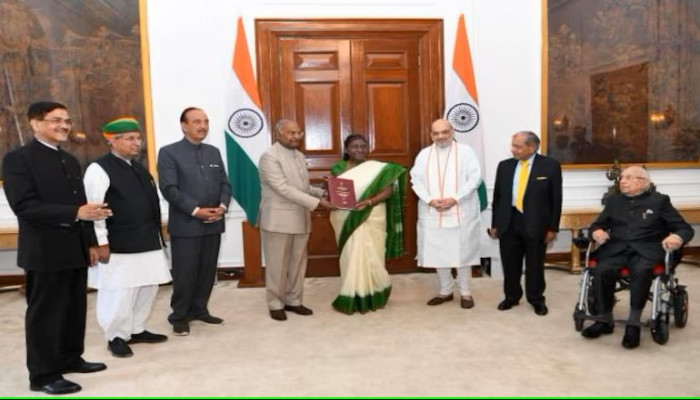After extensive consulting, the Ramnath Kovid Committee submitted its report on the One Nation One Poll. With more than 300 pages, the report thoroughly explored the historical and constitutional context of elections for Parliament and State Assemblies. It has proposed a road map for synchronising elections of Lok Sabha and all the State Assemblies. The key aspect of the recommendation is that the state assembly and parliament have a fixed tenure of five years.
Should there be a political and constitutional crisis, the committee proposed conducting elections again, but not for the full five-year term. Instead, the elections would be held for the remaining period in the 5-year term during which the dissolved house was elected. If, for example, the house is dissolved after completing just two years of its five-year term, then elections are to be conducted only for the remaining three years. The committee proposed that there shall be two distinct types of elections in the proposed new system. One is the general election, and the other is a midterm election. The general election is one for the normal 5-year term. The midterm election is conducted for any residual period when any house is dissolved and conducted for the completion of the residual period are called midterm elections.
By making reduced tenure, the system will ensure that Lok Sabha and all assemblies will have simultaneous elections even if some state assemblies or even the Lok Sabha gets dissolved before completion of its 5-year tenure. It will also ensure there is greater political stability in the country and the wastage of valuable time and resources is avoided. This writer was hoping that the committee may recommend making it mandatory to have a constructive no-confidence for the removal of the Chief Minister/Prime Minister wherein it should be mandatory to have an alternative candidate for the CM/PM position as a part of a confidence motion. This provision will ensure that the political crises do not result in the house's dissolution. In such a system the need for any fresh elections due to the failure of any person to command majority is almost removed.
As was seen in Germany and other countries, this requirement to have an alternative candidate will reduce the political crises leading to the dissolution of the house dramatically. But the committee seems to favour fresh election for the residual period in the 5-year term in the cases wherein no one commands a majority in the house or for any reason the house is dissolved.
The new recommendations also stipulate that within 100 days of the general election, all the local body elections, that is, the Panchayat, Municipal and other local authority elections, are conducted. The said bodies are also will have a fixed tenure of five years and, in case of any political and legal reasons for conducting fresh elections before the completion of the said five-year term, the same system of mid-term elections stipulated for Parliament and Assembly elections for the residual period will apply. This is a major step that will ensure the effective functioning of the local administrations.
Presently, there is a complete lack of seriousness from the state governments regarding the timely conduct of local body elections and the creation of an effective local administration. If accepted, this recommendation will ensure that the elections are held for local bodies on time, resulting in greater democratic participation.
The Ramnath Kovid Committee has recommended various ways to achieve such synchronised elections. Initially, elections will be held for the respective terms to achieve synchronisation by conducting elections for smaller tenures to nearly national general elections of terms. Once a national level synchronisation is achieved, the general and midterm election system can be put in place seamlessly. It also proposed reforms for voter lists and other steps to ease the participation of the citizens in the elections and also ensure more effective administration of elections.
This will have an impact on the political side, ensuring greater political stability at the national level and also in the states. Political leaders will be much less inclined to destabilise the elected administrations as it will not benefit them, as any dissolution of the house will only give them a much shorter i.e. only the residual tenure of the respective house. Political stability naturally leads to consistency in policy matters and administrative actions, and that, in turn, will help our nation develop at a much faster pace.
However, to implement these recommendations, we need to amend the constitution suitably and that needs to be approved not just by Parliament, but also by the required number of State Assemblies. Unfortunately with most of our political parties favouring the instability and chaos, it will be hard to pass such an amendment. BJP has to start well by obtaining a two-thirds majority in the Lok Sabha now and take it from there.
Image source: MoneyControl







Comments